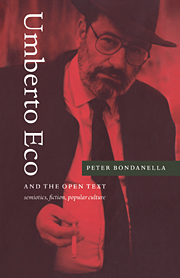Book contents
- Frontmatter
- Contents
- Preface
- ONE Umberto Eco's intellectual origins: medieval aesthetics, publishing, and mass media
- TWO The Open Work, Misreadings, and modernist aesthetics
- THREE Cultural theory and popular culture: from structuralism to semiotics
- FOUR From semiotics to narrative theory in a decade of radical social change
- FIVE “To make truth laugh”: postmodern theory and practice in The Name of the Rose
- SIX Interpretation, overinterpretation, paranoid interpretation, and Foucault's Pendulum
- SEVEN Inferential strolls and narrative shipwrecks: Six Walks and The Island of the Day Before
- EIGHT Conclusion
- Bibliography
- Index
SIX - Interpretation, overinterpretation, paranoid interpretation, and Foucault's Pendulum
Published online by Cambridge University Press: 23 October 2009
- Frontmatter
- Contents
- Preface
- ONE Umberto Eco's intellectual origins: medieval aesthetics, publishing, and mass media
- TWO The Open Work, Misreadings, and modernist aesthetics
- THREE Cultural theory and popular culture: from structuralism to semiotics
- FOUR From semiotics to narrative theory in a decade of radical social change
- FIVE “To make truth laugh”: postmodern theory and practice in The Name of the Rose
- SIX Interpretation, overinterpretation, paranoid interpretation, and Foucault's Pendulum
- SEVEN Inferential strolls and narrative shipwrecks: Six Walks and The Island of the Day Before
- EIGHT Conclusion
- Bibliography
- Index
Summary
After the incredible success of The Name of the Rose, Eco turned his attention for roughly a decade to the question of textual interpretation – always a favorite theme in his critical essays – now incorporating this interest within the complex plot of a difficult novel, Il pendolo di Foucault (Foucault's Pendulum, 1988). Like Eco's first novel, the context and meaning of which are clearly enriched by at least a passing knowledge of Eco's other theoretical works on narrative theory, semiotics, and popular culture, reading Foucault's Pendulum will probably constitute a more satisfying experience if the reader is familiar with the social or critical problems that interested Eco during the decade following the composition of his first fictional work. In short, a successful reading of the novel requires Eco's brand of model reader.
The least frequently cited of the specific works providing a theoretical background to Eco's second novel constitutes the most important clue to the writer's thinking at this point in his career. It is a theoretical introduction to a collection of Italian essays on esoteric interpretations of Dante from the nineteenth century – L'idea deforme: interpretazioni esoteriche di Dante (The Distorted Idea: Esoteric Interpretations of Dante, 1989) – research carried out by Eco's students in a seminar at the University of Bologna on “hermetic semiosis” that took place in 1986. The essay contains a relatively complete and well-developed outline of Eco's historical contextualization of contemporary theories on interpretation and overinterpretation, views that constitute the core of two books widely distributed both in Italian and in English – I limiti dell'interpretazione (The Limits of Interpretation, 1989) and the collection of Tanner Lectures Eco presented at Cambridge University in 1990.
- Type
- Chapter
- Information
- Umberto Eco and the Open TextSemiotics, Fiction, Popular Culture, pp. 126 - 153Publisher: Cambridge University PressPrint publication year: 1997



